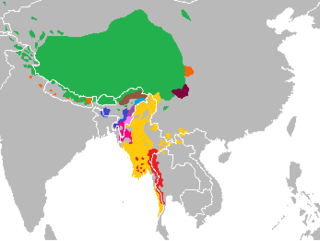Nishi may refer to:
Nishi may refer to:
NA, N.A., Na, nA or n/a may refer to:

The Tibetic languages form a well-defined group of languages descended from Old Tibetan. According to Tournadre (2014), there are 50 languages, which split into over 200 dialects or could be grouped into 8 dialect continua. These languages are spoken in the Tibetan Plateau and in the Himalayas in Gilgit-Baltistan, Aksai Chin, Ladakh, Nepal, Himachal Pradesh, Uttarakhand, Bhutan, and the Kachin State of Myanmar. Classical Tibetan is the major literary language, particularly for its use in Buddhist literature.
Anal may refer to:
Rai or RAI may refer to:
Tani, is a branch of Tibeto-Burman languages spoken mostly in Arunachal Pradesh, Assam, and neighboring regions.

Gurung, also known as Tamu Kyi or Tamu Bhāṣā, is a Sino-Tibetan language spoken by the Gurung people of Nepal. The total number of all Gurung speakers in Nepal was 227,918 in 1991 and 325,622 in 2011.
Kora may refer to:
Miri is a city in northern Sarawak, Malaysia, on the island of Borneo.
Kom or KOM may refer to:

The Central Institute of Higher Tibetan Studies, formerly called Central University for Tibetan Studies (CUTS), is a Deemed University founded in Sarnath, Varanasi, India, in 1967, as an autonomous organisation under Union Ministry of Culture. The CIHTS was founded by Pt. Jawahar Lal Nehru in consultation with Tenzin Gyatso, the 14th Dalai Lama, with the aim of educating Tibetan youths in exile and Himalayan border students as well as with the aim of retranslating lost Indo-Buddhist Sanskrit texts that now existed only in Tibetan, into Sanskrit, to Hindi, and other modern Indian languages.
Rawat may refer to:
Pattani, also known as Manchad, is an endangered Sino-Tibetan language spoken in the Indian state of Himachal Pradesh.
Nisi may refer to:
Jangali or Jangli may refer to:

The Tibeto-Burman languages are the non-Sinitic members of the Sino-Tibetan language family, over 400 of which are spoken throughout the Southeast Asian Massif ("Zomia") as well as parts of East Asia and South Asia. Around 60 million people speak Tibeto-Burman languages. The name derives from the most widely spoken of these languages, Burmese and the Tibetic languages, which also have extensive literary traditions, dating from the 12th and 7th centuries respectively. Most of the other languages are spoken by much smaller communities, and many of them have not been described in detail.
Mukhia or Mukhiya may refer to:
Karbi may refer to:

Nyishi (Kamle) or Sarak is a Tani language of India. It is spoken in Arunachal Pradesh by an estimated 9,000 people of the Nyishi tribe. It appears to be a dialect of the Nishi language.
Kabui Naga may refer to:
Tangkhul Naga may refer to: